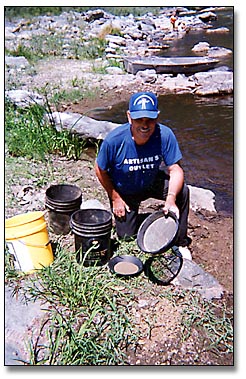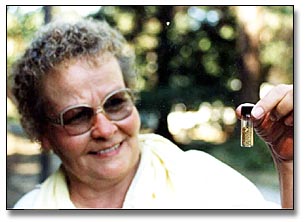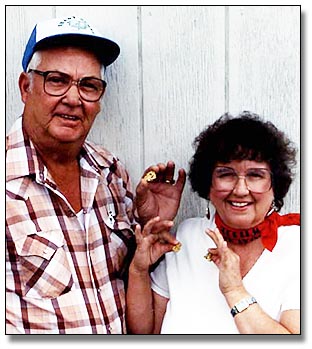By Dave McCracken
I know I’m going to have a great season! How about you?

Springtime! The days are getting longer and warmer. The birds are chirping. And, there is a magic in the air created by all of the living things waking up for a new start. This is when most of us who live on or near the river start really feeling the gold fever itch. Miners start returning to the river, and you can really feel the excitement about the prospects of the new season. What is it about spring that gives people so much renewed hope and interest? Even people who failed utterly during seasons past, who considered giving up gold mining forever, seem to be rejuvenated at the beginning of a new season!
feel the excitement about the prospects of the new season. What is it about spring that gives people so much renewed hope and interest? Even people who failed utterly during seasons past, who considered giving up gold mining forever, seem to be rejuvenated at the beginning of a new season!
Spring and early summer is usually the time when most of us are pulling our mining equipment out of storage, wiping off the cobwebs, doing the needed repairs, and ordering the necessary replacement gear and additional equipment to start our new gold mining adventure. We are also spending a lot of time thinking about where we are going to mine.
Having a successful mining season depends on many things. But all of these basically fall into four separate categories: having the right equipment; having the experience and knowledge to do it properly; having a location where recoverable gold deposits are present; and most of all, having good management–meaning the right approach!
Basically, if you have dependable equipment and you have a gold bearing location, and you know how to use the equipment to find and recover gold deposits, then you obviously can be successful. Creating the condition of having the right equipment, knowledge and location will be accomplished by you. You will decide on what equipment to use and how to service it and keep it operational. You will decide how you are going to improve your mining skills–or you will decide you don’t need any improvement. And you will decide where you are going to mine. Therefore, the final category, management, is more important than any of the others.
It is very important to know all of the technical aspects of successful gold mining: what pay-streaks are and how to find them, how to cleanup, the best way to utilize your equipment, etc. The “how-to” is one of the most important categories, but, what good is it go know the technical points if a person is going to approach gold mining with a losing attitude?
There is an emotional scale on which any person or group can be found with regards to any subject or activity. At the top of the scale is enthusiasm; down about halfway is anger and resentment, and at the bottom is total apathy and regret.
A person at the top of the scale, approaching the activity of mining with interest and enthusiasm, would try to do everything the right way. He or she would obtain the best possible equipment within his or her available resources. The equipment would be properly maintained. Communication would be energetically and enthusiastically undertaken to determine new and exciting places to mine, with plenty of new friends and allies being made along the way. And the person would be absolutely willing to learn everything possible about those aspects of mining that would affect his or her type of operation, even though he or she may already know a great deal.
Everybody makes mistakes–especially when learning. A person high on the emotional scale would recover quickly from mistakes, and enthusiastically approach his or her mining operation with the new-found knowledge. The idea of failure or giving up would probably never be considered. Also, at the highest level of responsibility, the person would not be found blaming others or “the world” for his or her momentary setbacks. Instead, the person would confront his or her mining activity with renewed energy and build his or her own success in the world. This is the way that successful people do it! It is the way you win in the game of gold mining.
A person who is further down the emotional scale will not take responsibility for the problems that are occurring in his or her mining operation. The person will feel more like his or her success and destiny are not really self-created, but are more at the effect of other people or the world at large. Most likely, the person will be found resenting others who are succeeding. The person is not as willing to make the extra effort to do things the right way in the first place, and not as willing to confront mining with the necessary perception to be able to predict what things to prepare for. Therefore, more mistakes will be made. In anger and resentment, this person is generally found striking out at the world, and generally is blaming others for his or her “bad luck.”
This type of person, for lack of incentive, and for lack of personal responsibility, will usually approach mining impatiently. If he or she does not have enough money to buy the proper equipment, rather than wait and do it right, the person is likely to buy worn-out gear, or equipment that is not large enough to work efficiently in the person’s operation. He or she is more likely, for lack of personal incentive, to allow damaged or worn equipment to go on without service or repair, which ultimately results in more damage or costly accidents. The
person is more likely to get angry and to give up because he or she is not able to locate an acceptable gold deposit right away. And the inability to find paying deposits is neverbecause the person does not know how. In the person’s “expert opinion,” it is because there simply is no gold left, or someone else already took it all.
A person in the resentment stage is more likely to be seen blaming the dredge because it is in a poor state of repair. He or she generally won’t have very many real friends; and the friends the person does have will generally be found to agree on the same negative viewpoints: “The gold has already been taken.” We already are experts on mining.” “Watch out for others so they don’t steal our gold,” etc. A negative person generally will give little help to others when it comes to passing along useful information about the potential location of valuable gold deposits. Therefore, he or she places little value on the information received from others, because he or she knows “no one would give me real information on the location of gold!”
Also, negative people have difficulty learning new skills. Learning comes from perception–which results from taking the responsibility to take an honest look at the subject or activity. A negative person generally has the idea that he or she is wrong in some way if he or she admits that something can be learned about a subject.
A person at the bottom of the scale has completely given up and is not even blaming anyone else for failure, anymore. Such a person has little or no chance to succeed at gold mining on a continual basis.
All of us can be found somewhere along this scale as regards to how we are approaching gold mining–or life. There are levels between enthusiasm and anger, and between anger and total apathy at the bottom. A person’s basic survival (or success) level is largely determined by his or her volume of positive energy, in comparison to the volume of negative energy. That is what this scale is all about. People having more negative than positive will be found lower on the scale.
Of course, we all have our momentary good and bad moments–those times we sank our dredges, we were ready to give it up altogether. But, when we found the big nugget last year, we felt totally on top of the world!
The question is, how do we approach our gold mining ventures most of the time? Are we willing to stick ourselves way out there to confront every possibility in order to prepare? Do we share and communicate with others in order to improve our chances of success and theirs? Do we try to do everything the right way in the first place? Are we willing to defend our industry when it is in trouble? When we are not enjoying immediate success, do we utilize all of our energy to create success? Or, do we use our energy to complain or justify our failure? Just how are we positioning ourselves around this activity of mining?
When it comes down to it, how well we do in gold mining on the long term always comes back down to how we are approaching the activity. We ARE responsible for how well we do. Isn’t this great?
Just how do you change the way that you are? You do it with personal discipline, by boosting yourself up to a higher level of responsibility.
 There is more to success than hard physical work. Success breaks down to the above four categories. Knowing how to do it properly is one of them! If success is continually lacking, then something is definitely lacking in one or more of the four categories.
There is more to success than hard physical work. Success breaks down to the above four categories. Knowing how to do it properly is one of them! If success is continually lacking, then something is definitely lacking in one or more of the four categories.
If, however, an operation is temporarily not recovering very much gold, it does not mean there is a management problem–or even a problem with the other three categories. By the nature of gold mining, there are times when we are not into gold deposits–but rather are looking for them.
If a person is blaming anyone other than himself for the long-term lack of success of his or her operation, there definitely is a problem with management!
But, it is Spring; there is magic in the air, and we all have renewed high expectations about the upcoming season. As a sobering thought, in the renewed excitement, some people seem to forget all of the pain and misery they were experiencing last year–only to recall it again once they get started. Spring cannot change the basic way you approach mining. Only you can do that. To experience the magic of success in any activity, failure and inability has to be overcome by positive energy and personal discipline. True magic cannot be obtained by forgetting failure or justifying it away.
the basic way you approach mining. Only you can do that. To experience the magic of success in any activity, failure and inability has to be overcome by positive energy and personal discipline. True magic cannot be obtained by forgetting failure or justifying it away.
So, if you want to experience excitement, and the true magic feeling of recovering valuable gold deposits continually, you must depend upon and improve your own skill, rather than depend on your luck. Your skill will improve in direct proportion to your correct basic approach to gold mining.
Spring is here, and it is time to work on the dredges. I cannot wait to get into the water! I know I’m going to have a great season! How about you?
- Here is where you can buy a sample of natural gold.
- Here is where you can buy Gold Prospecting Equipment & Supplies.
- More About Gold Prospecting
- More Gold Mining Adventures
- Schedule of Events
- Books & Videos by Dave McCracken





